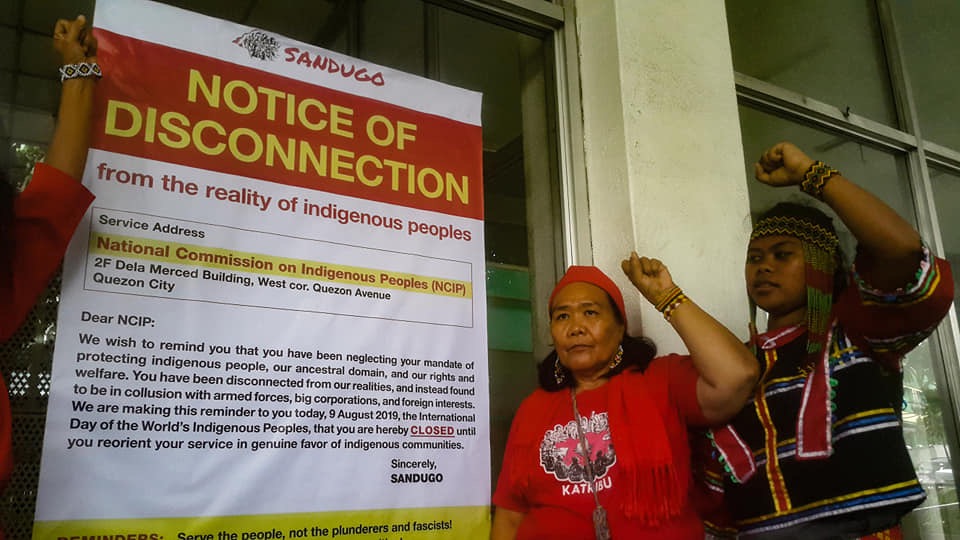Indigenous peoples continue to face an “uphill battle for the recognition and respect of their rights to self-determination and to their ancestral domain, in which their identities are anchored.”
By JANESS ANN J. ELLAO
Bulatlat.com
MANILA – On the International Day of the World’s Indigenous Peoples, Filipino progressives decried how indigenous peoples in the country are being targeted – killed and driven away from their ancestral domains – to pave way for multinational corporations.
“We are here to protest our suffering and continued oppression. In the past centuries, we have been driven away from our lands to satisfy the hunger of greedy colonizers; today, it is the turn of big businesses,” said Lumad leader Kerlan Fanagel in a statement.
Under the Duterte administration, 59 indigenous peoples have been killed while several others were charged with trumped-up cases and are behind bars. Thousands, too, have been displaced due to ongoing military operations in their ancestral domains.
Katribu said indigenous peoples continue to face an “uphill battle for the recognition and respect of their rights to self-determination and to their ancestral domain, in which their identities are anchored.”
Attacks against those supporting IPs
Supporters, too, of indigenous peoples in the country have been targeted. Among the most recent is journalist and human rights activist Brandon Lee who is based in Ifugao, a province north of Manila.
Lee, who has long been red-tagged by the Philippine military, suffered multiple gunshot wounds on Aug. 6 when assailants fired at him. He survived the shooting incident but continues to be subjected to surveillance as he is still in critical condition in a local hospital.
In Bukidnon, soldiers attempted to arrest church lay worker and radio station manager of the now defunct Radyo Lumad Kristin Lim.
Fanagel said indigenous peoples in the country are “neglected” and “betrayed” by its own government that dragged them “further in poverty, illiteracy, and disease.”
Closure of IP schools
Under the Duterte administration, tribal schools were also shut down. Last month, the Department of Education suspended the operations of at least 55 tribal schools serving Lumad children.
The suspension was based on claims of National Security Adviser Hermogenes Esperon Jr. that students are not being taught according to the guidelines of the education department and are instead taught “ideologies that advocate against the government.”
Fanagel said these tribal schools were set up by their respective communities in “hopes that our children will no longer be vulnerable to illiteracy and ignorance, were supposed to help develop our ancestral lands and communities; now they are being closed down. Paramilitary groups established and funded by the AFP are wreaking havoc and disunity among us.”
Sowing terror, militarization of civilian agencies
Indigenous peoples groups also noted the continuing militarization of civilian agencies, which are being turned against them and result in worse human rights violations. Among the civilian agencies being headed now by a former military officer is the Department of Social Welfare and Development and the Philippine Health Insurance or Philhealth.
Katribu noted that as if adding insult to injury, Duterte appointed retired military officer Allen Capuyan as head of the National Commission on Indigenous Peoples. He is also the head of the National Task Force to End Local Communist Armed Conflict (NTF-ELCAC).
In a short protest action today, tribal leaders served a closure notice at the NCIP’s office “for practically selling off ancestral lands to corporations and destructive megaprojects” and “its betrayal of the very communities it is mandated to serve,” Fanagel said.
The government’s counterinsurgency plan and its “Whole of Nation” approach has been “deceitfully framing their communities as NPA (New People’s Army) hotbeds,” said Fanagel.
“With whole communities of indigenous peoples terrorized, destructive projects such as China-funded Kaliwa Dam Project, Balog-balog Dam, and Chico River Pump Irrigation Project will be more easily enforced. Documents stating free, prior, and informed consent (FPIC) can easily be obtained from a fearful and disunited community,” he added.
Big businesses, Oceanagold
With interests of big businesses being prioritized by the government, Katribu said indigenous peoples in the country continue “fight to nurture our ancestral lands for the next generations and to protect the country from the deadly and destructive effects of the global climate crisis.”
Indigenous peoples from Didipio, Nueva Vizcaya, for one, have been struggling against mining firm OceanaGold as they have faced “decades of division and displacement.”
The recently-concluded national solidarity and fact-finding mission found numerous rights violations experienced by the residents at the barricade such as red-tagging, surveillance, intrusions in their homes, as well as threats of dispersal and harm against the barricade.
“Oceanagold must be held accountable for its mounting human rights atrocities,” said Leon Dulce, national coordinator of Kalikasan Philippine Network for the Environment.
Apart from the Philippines, simultaneous protest actions also took place in Australia, El Salvador, and Canada calling for the non-renewal of Ocenagold’s operations.
The post Rights abuses, land grabbing confront indigenous peoples in PH appeared first on Bulatlat.

